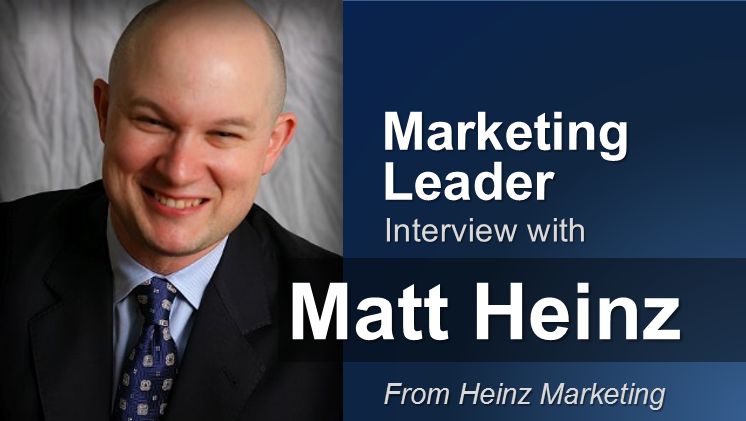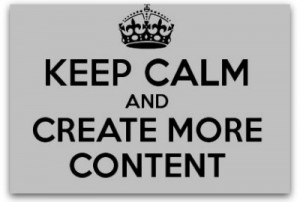Today’s marketing expert Matt Heinz, president of Heinz Marketing in Redmond, Washington. Matt brings over 15 years of experience in sales and marketing. He is the author of five books on selling, social marketing, field marketing and web strategy.
Matt was recognized as one of the top 50 Sales & Marketing Influencers by Sales World in 2012. In this interview, Matt shares his thoughts on good marketing which are based on a very complete set of the tools and strategies that make marketers successful today: from writing and content marketing to metrics and data. Enjoy.
1. What company is an example of good marketing today? Who do you admire?
Hubspot and Marketo are nailing it, in my opinion. Great content, great understanding of their customers, lots of respect for the buyer and the stage they’re at in the buying cycle. I guess you would expect market-leading platforms to be particularly good at the marketing, but that’s not always the case. Here it certainly is.
2. Did you have a mentor or a person you learnt the most from? What was a key lesson?
I’ve learned and continue to learn from so many people. I truly am inspired and educated on a daily basis by amazing people who share on their blogs, in podcasts, at conferences, etc. But if I had to narrow down the most important business mentor I’ve had to date, it would be Don Gregory (president for OnTarget Consulting & Research). He epitomizes servant leadership. The way he conducts himself and his company, the values he holds and preserves, truly an inspiration for me.
3. What story of a successful marketing strategy could you share?
We’ve built our business almost entirely on content and social, which is to say entirely on content. Social is just a channel, after all. Your Twitter strategy would suck (or may suck) without good content that resonates, creates interest, and ultimately drives action from your customers and prospects.
4. What is your marketing superpower, the most important skill that makes you a great marketer?
I think I’m a good writer. I’ve been writing as long as I can remember, and I’m fortunately that it comes relatively naturally for me. I don’t spend a lot of time writing and rewriting drafts. We produce a ton of content for ourselves and our clients, so the ability to “bang it out” as they say has been really valuable.
5. What interesting book have you read recently?
One of the best books on marketing I’ve read in the past five years is Scientific Advertising by Claude Hopkins. It was written in 1923 but is still intensely relevant today. Short book, you’ll finish it on a focused two-hour flight. Highly recommended.
6. What new, modern tactic, tool, or aspect of marketing should marketers pay more attention to?
Predictive analytics. The ability to translate more data into the right data and the precise next step or piece of content that will help move an individual prospect forward. Micro marketing at an individual level like this isn’t the future. It’s here now. Check out Lattice Engines and Infer for examples of how this is manifesting already for market-leading companies.
7. What good aspect of basic marketing have marketers neglected in recent years?
In B2B, I have yet to see a building write a check. You’re not really selling something to a business, you’re selling to people. Those people make rational and irrational decisions, logical and emotional decisions, they’re motivated by selfish pursuits as well as company objectives.
This is important to keep in mind not only in how we communicate to them (most B2B marketing messages are entirely too stuffy) but in the topics we choose to engage & influence them.
8. What skills will marketers will need in the future? How do you stay sharp?
The most important skill set of sales & marketing professionals is writing, I strongly believe that. Writing is the basis for a variety of forms of communication – including video, spoken word and more. If you can write clearly and effectively, so much of your marketing and results will get easier.
The learning curve is accelerating faster today than ever before too. It’s more important than ever for marketers to constantly be students of their craft. Read what others are doing. Focus on the best and worst practices. Be religious about reading MarketingProfs, MarketingSherpa, SmartBriefs and other aggregated/curating sources of great real-time best practices happening around you.
9. What was the turning point in your career?
Truly it was when I finally developed the confidence (or stubbornness) to step out on my own. Scariest moment of my career but the best move I’ve made so far too.
10. How do you increase marketing’s relevance and influence in the organization?
Most marketing organizations are seen as a cost center. The CMO may not like this, but they perpetuate this by not focusing their activities and metrics on revenue-producing objectives. Simply put, marketing needs to have revenue responsibility.
If you can align your strategy & tactics towards revenue, you can create a profit center out of marketing. And in a world where 75% of the buying process is completed before sellers are engaged (based on various research reports recently), that means marketing owns the majority of the sales process. They have a huge role in driving sales velocity and conversion whether they like it or not!
11. What blog would you recommend?
There’s no single blog that covers everything. If you’re building a marketing RSS feed from scratch, I’d recommend Ann Handley, Andy Sernovitz, Craig Rosenberg, Scott Brinker, Michael Brenner, Howard Sewell and Joe Pulizzi as well as the well-written blogs from Marketo and Hubspot.
12. What experience in your past has best prepared you to be a marketing leader?
Failure. It is a constant for innovative marketing organizations. If you’re not failing, you’re not learning and innovating.
Bonus: Question: How marketing leaders can be better mentors and true leaders of their teams?
Let your people shine. Let them make mistakes and learn from them. Get them out of their comfort zones but wrap them in all the support, encouragement and coaching they need. Develop your successors. Ask probing questions that help your team come to the right conclusions on their own.
I want to thank Matt for spending his valuable time on this interview. Follow Matt on his blog, Matt on Marketing and follow him on Twitter. You will most likely find his books quite useful, and has written 5 of them available here.
One last thought from Matt’s blog:


